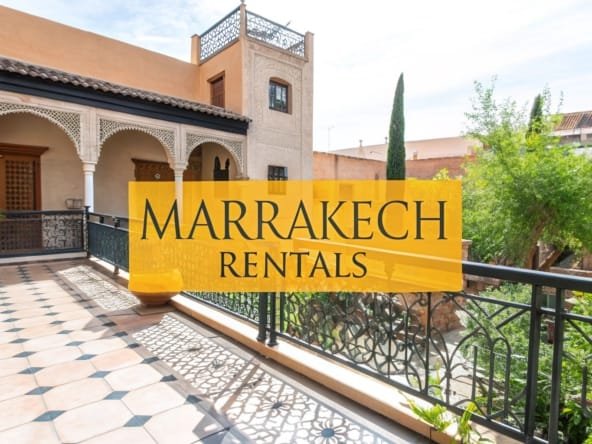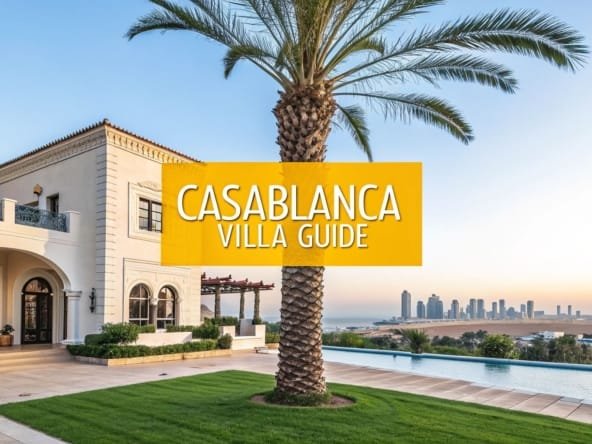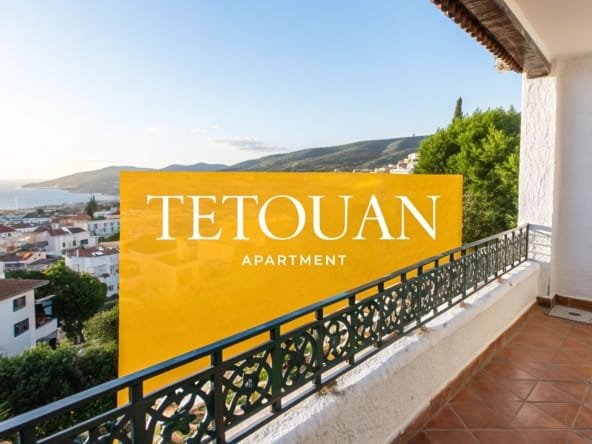Starting your search for an apartment in Morocco, or a location appartement autour de moi, is an adventure in itself. It’s less about just finding four walls and a roof and more about understanding the unique pulse of the city you're in. The process in a bustling metropolis like Casablanca feels worlds away from finding a quiet spot in a smaller town, but with a bit of local know-how, you can navigate it all.
Getting to Grips with the Moroccan Rental Market
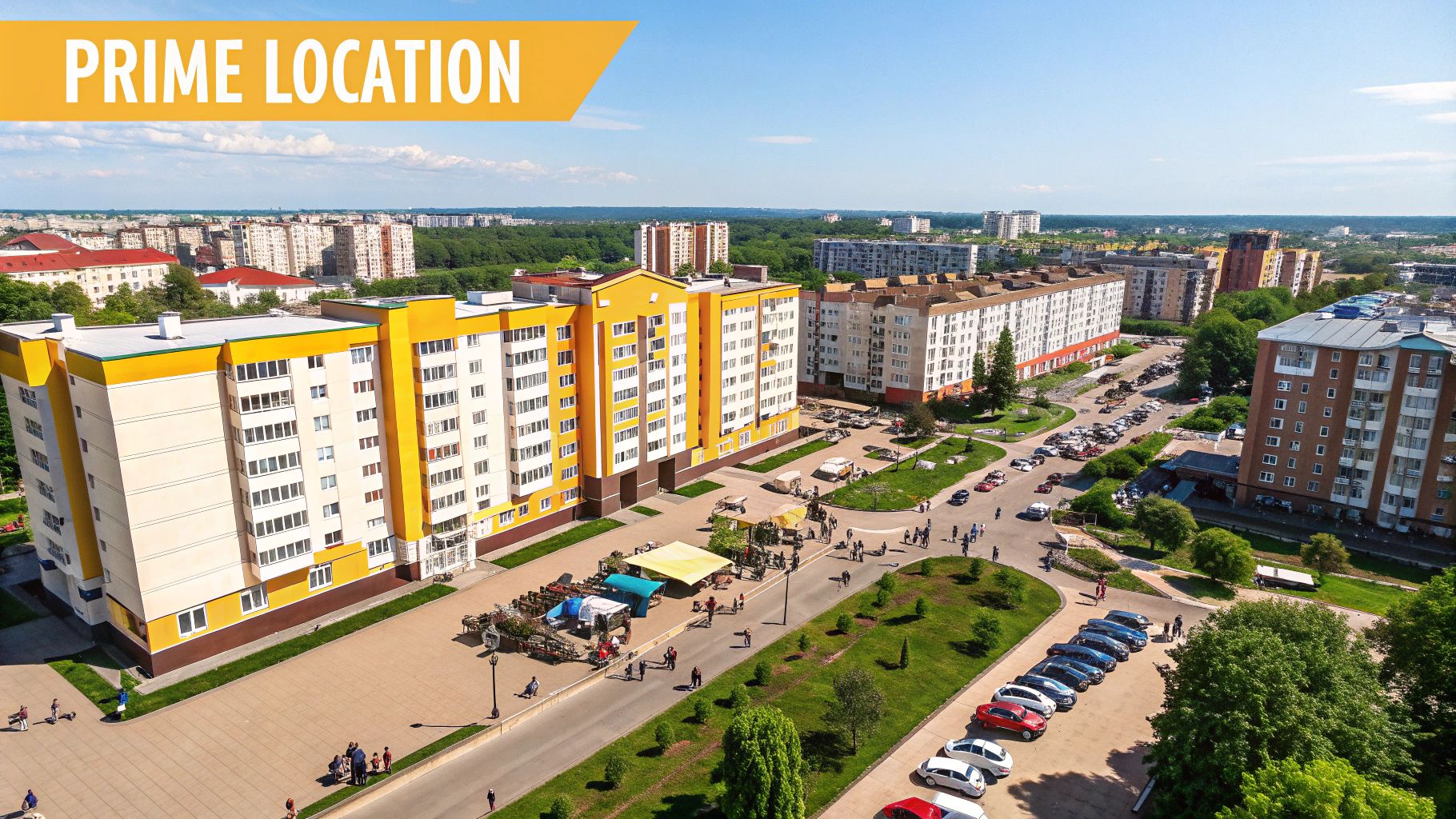
Before you even start looking at listings, it helps to understand the lay of the land. Morocco’s rental market isn't one-size-fits-all; it's a vibrant mosaic of different regions, each with its own character and quirks. What you'll find in the imperial city of Fes is completely different from the modern coastal vibe of Tangier.
The Big City Buzz vs. Small-Town Charm
In major hubs like Casablanca or Marrakech, expect a fast-paced, competitive environment. The property pool is vast, ranging from brand-new, modern flats to beautiful, character-filled apartments in older, French-colonial buildings. Be prepared to move quickly—good places here get rented in a matter of days.
Smaller towns, on the other hand, offer a different experience. The pace is slower, the rent is often more affordable, and the properties can be more traditional. Here, it’s not just about what you find online. Local connections are golden, and word-of-mouth recommendations from a shopkeeper or café owner can lead you to the best finds.
Diving into Market Realities
The rental scene is tied to the wider economy. We can see parallels in other global markets; for example, recent data from the Massachusetts housing market showed that even with slowing price growth, competition stayed fierce, with median home prices still rising by 4.0% year-over-year. As detailed in market analysis from sources like Guthrieschofieldgroup.com, local supply and demand are what truly dictate renter affordability. Morocco is no different.
Your most powerful tool in this search is clarity. Before anything else, decide what you absolutely cannot live without. Is it being close to your job, in a certain school catchment area, or near a tram line? Nailing down your priorities from the start will save you a world of time.
Of course, your budget is the ultimate filter. Prices swing dramatically across the country. A one-bedroom flat in a desirable neighbourhood of Casablanca could easily cost two or three times as much as a comparable apartment in Meknes. You need to be realistic and factor in not just the rent, but also utilities, building fees (syndic), and any potential agency commissions.
Tapping into Digital Tools to Find Your Apartment
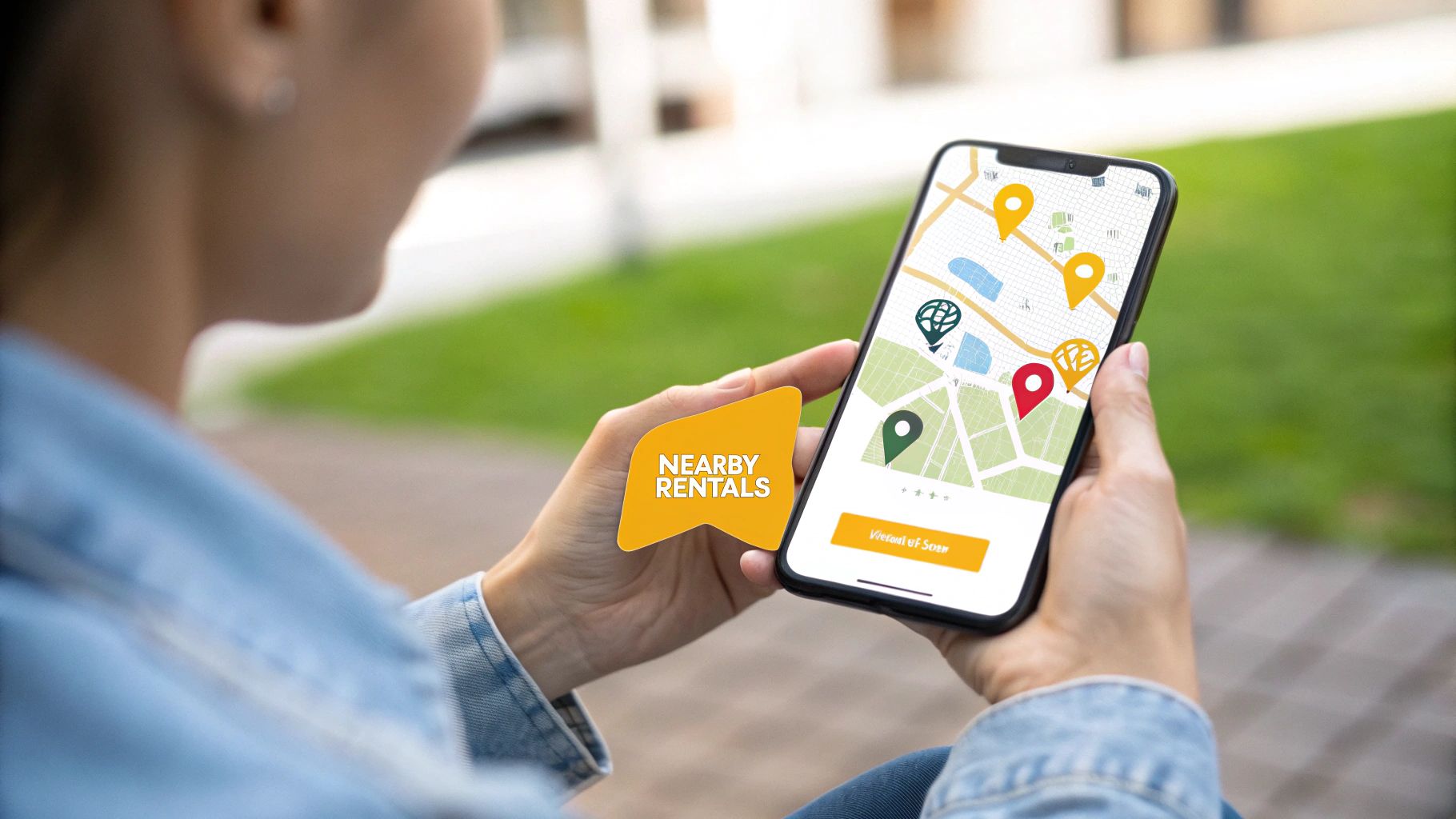
These days, your search for an "appartement à louer près de chez moi" (apartment for rent near me) almost always begins online. The first places any seasoned renter in Morocco will tell you to look are the big three property portals: Avito.ma, Mubawab.ma, and Sarouty.ma. Think of them as massive, constantly updated bulletin boards for the entire country's rental market.
The sheer volume of listings can be overwhelming, which is why mastering the search filters is non-negotiable. Don't just scroll endlessly. Get specific. Filter by neighbourhood (quartier), set a firm budget, and tick off your must-have amenities, whether that's a lift, a balcony, or that all-important parking spot. This is how you cut through the noise and create a shortlist of genuine contenders.
It's also smart to keep an eye on broader market trends. For instance, a report from BostonPads.com on the rental market in Medford, a city near Boston, showed a 22.28% jump in the vacancy rate, which tipped the scales in favour of renters. While that's an ocean away, the principle holds true here in Morocco—understanding whether the market is hot or cooling off can give you a significant advantage in your search.
Go From Browser to Proactive Hunter
Just passively looking at listings is a slow path to finding a great place, especially in sought-after areas of Casablanca or Marrakech. You need to switch into a more proactive mode.
One of the most effective things you can do is set up alerts on the property websites. Create a search with all your ideal criteria—price, location, number of bedrooms—and then save it with notifications turned on. The moment a new apartment matching your list gets posted, you'll get an email or a ping on your phone. In a fast-moving market, being the first to inquire makes all the difference.
Expert Tip: Develop a keen eye for red flags in online ads. Listings with just one or two blurry photos, suspiciously vague descriptions, or a price that feels way too good to be true usually are. Always trust your gut and focus on the listings that provide plenty of clear pictures and detailed information.
The more you browse, the more you'll pick up on the local real estate lingo and get a feel for fair market prices. As you compare your options, it's also a good time to look for ways to keep costs down. For more on that, you might find our guide on the 10 secrets to finding affordable Marrakech apartments today really helpful.
Tapping into Local Expertise and Agencies
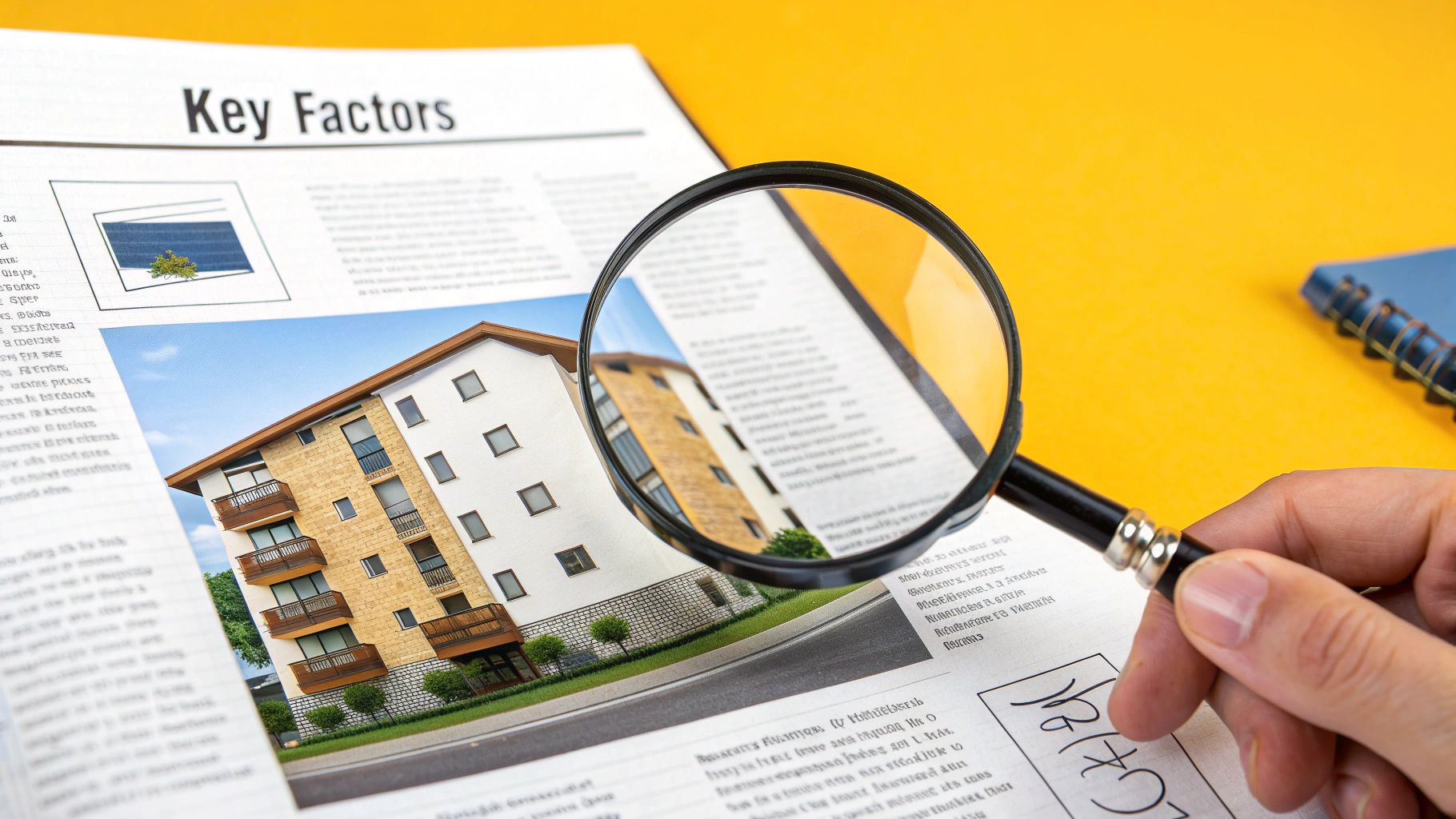
While starting your search for an location appartement autour de moi online is smart, you’ll quickly find that the real gems are often discovered on the ground. This is where local knowledge isn’t just helpful—it’s everything.
In Morocco, your search will likely lead you to two key players: the formal agences immobilières (real estate agencies) and the more traditional samsars (independent brokers).
Working with an agency provides a familiar, structured experience. They handle the listings, the viewings, and the paperwork, which is a huge relief if you're new to the country. The price for this convenience is a commission, usually one month's rent, which you'll typically split with the landlord.
The samsar, however, is a different breed. These are freelance brokers with deep roots in specific neighbourhoods. They operate on word-of-mouth and often know about an apartment before a "For Rent" sign ever goes up. Their fees might be more flexible, but always make sure you agree on the cost before you start looking at places together.
Getting Hyper-Local: Your Secret Weapon
Beyond the professionals, your best leads will come from the community itself. Never underestimate the power of simply talking to people.
- Chat with the Gardien: The building's concierge or caretaker is an incredible source of intel. They know the ins and outs of the building and are often the first to hear when a tenant is planning to move.
- Stop by the Local Hanout: The owner of the corner shop sees and hears it all. A friendly chat mentioning you're searching for a flat can spread the word faster than any online ad.
- Ask Potential Neighbours: If you've zeroed in on a building or street you love, don't be shy. Striking up a conversation with residents can give you direct leads and honest opinions about life there.
This boots-on-the-ground method takes a bit of initiative, but it’s how you uncover the best opportunities. Market dynamics can change in a heartbeat. For example, a recent report for Boston showed the real-time apartment availability rate jumped by 3.36% in just one year. You can see how these trends are tracked on BostonPads.com. Grasping these local nuances, whether in Boston or Casablanca, is what separates a frustrating search from a successful one.
Key Takeaway: Many of the most desirable apartments in Morocco are never advertised online. Building a small, local network puts you first in line for these properties. The winning strategy is to blend your digital search with genuine, real-world connections.
You’ve found a promising listing for a location appartement autour de moi and an appointment is set. Fantastic! But remember, the photos are just the highlight reel. The viewing is your opportunity to play detective and really see what you’d be living with day-to-day.
Don't just walk through—interact with the space. Your first big red flag to look for is humidité (dampness). Keep an eye out for peeling paint, dark stains on the ceiling, or that unmistakable musty smell, especially in the kitchen and bathroom. These aren't just cosmetic issues; they often point to deeper, more serious problems with plumbing or insulation that you don't want to inherit.
The Detailed Walk-Through
Once you've done a general sweep, it's time to get a bit more hands-on. Think of it as a test drive for your future home.
- Utilities Check: Turn on the taps. How's the water pressure? Does the hot water actually get hot, and how long does it take? Flip light switches and test a few electrical sockets with your phone charger.
- Windows and Doors: Open and close everything. Do they seal properly? Gaps and drafts can mean chilly winters and higher energy bills.
- Common Areas: Don’t forget to look at the building's shared spaces. A clean, well-kept entryway and stairwell often signal a diligent landlord or a proactive building management (syndic).
Seriously, document everything. Use your phone to take photos and videos of the entire apartment, making sure to zoom in on any pre-existing issues like scuff marks, cracks in the tile, or a leaky faucet.
This isn't just for your own reference. This visual evidence is crucial for getting your security deposit (caution) back in full when you decide to move out. It’s your proof, preventing any potential disputes down the road.
This is also your prime chance to get clarity from the landlord or agent. Ask directly about the total monthly costs beyond the rent. What are the building fees (syndic)? Which utilities are included, and which are your responsibility? Are there any specific building rules you should know about? Getting these answers now saves you from any nasty financial surprises after you've already signed the lease.
Understanding the Moroccan Lease Agreement
After weeks of searching for "location appartement autour de moi," you've finally found the perfect place. Now comes the most critical part of the process: securing it legally with the rental contract, known in Morocco as the contrat de bail. Getting this document right is absolutely essential for a stress-free tenancy.
The Moroccan lease agreement itself is usually a standard affair, but the devil is in the details. You need to carefully check every clause. Pay close attention to the exact rent amount, the length of the lease (which is typically one year), and who is responsible for what kind of maintenance. Whatever you do, don't just skim the termination clause; this section dictates how much notice you need to give if you plan to move out.
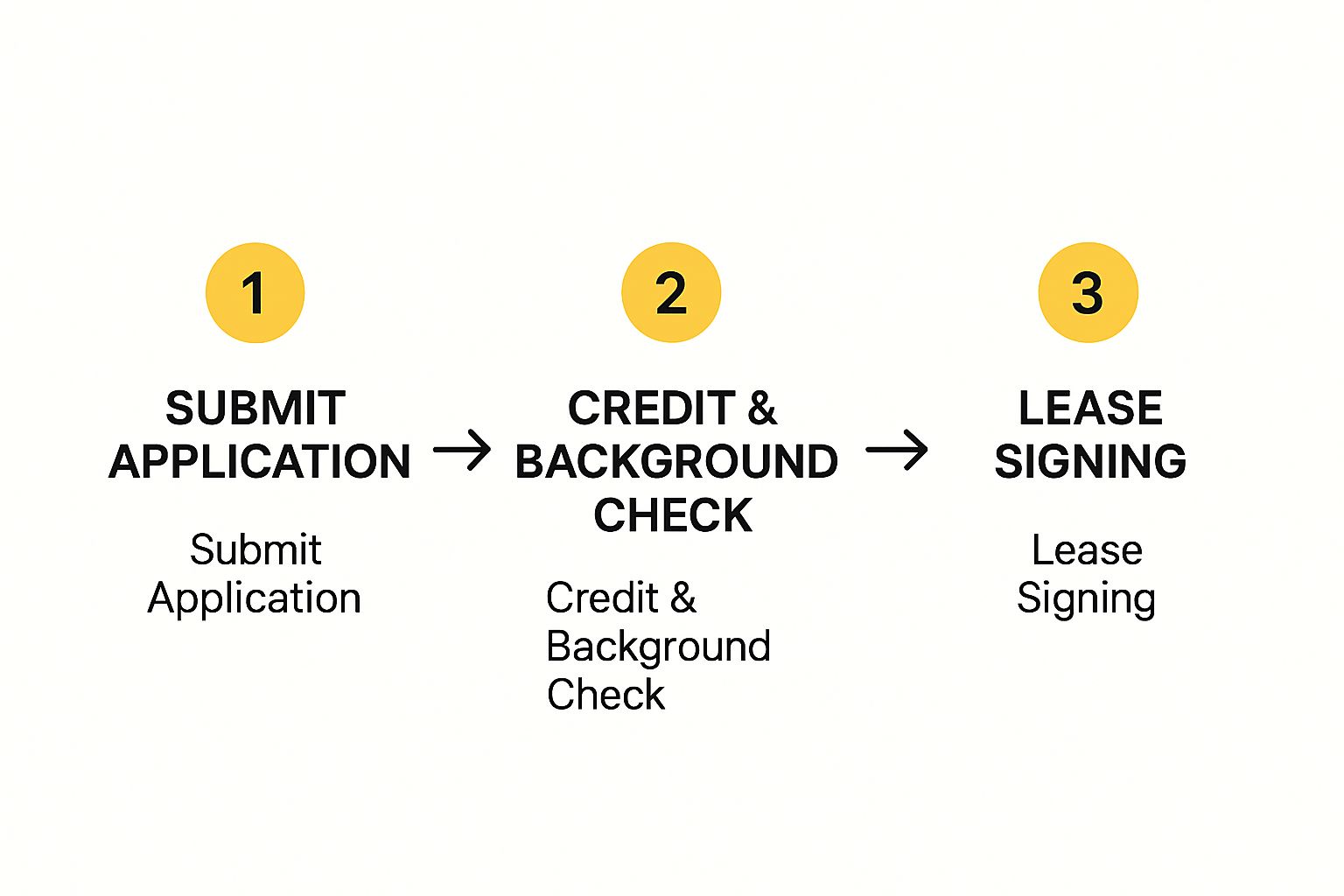
This final step is where all your hard work and searching come together, making the agreement between you and the landlord official.
What You'll Need to Finalise the Deal
Before you get the keys, you'll need to have your documents in order. The landlord will almost certainly ask for:
- A copy of your ID: For locals, this is the carte nationale. For expats, a passport will do.
- Proof of your income: This shows you can reliably pay the rent. Recent pay slips or a contract of employment are standard here.
For a closer look at some of the unwritten rules and expectations, it's worth reading our guide on what they don't tell you when renting in Morocco.
Your best friend in any rental transaction is a solid paper trail. Insist on a signed receipt for every single payment—especially the security deposit (caution) and the first month’s rent. This simple piece of paper is your strongest defence if any financial disagreements come up later.
The final step involves paying the security deposit, which is usually equivalent to one or two months' rent, plus your first month's payment upfront. Once the ink is dry on the contract and the funds are transferred, the keys are finally yours.
Congratulations, you've just secured your new home in Morocco
Answering Your Questions About Renting in Morocco
When you first start looking for a location appartement autour de moi (apartment for rent near me), it’s natural to have a lot of questions. Getting the right answers from the start builds confidence and helps you avoid any nasty surprises down the line. Let's walk through some of the most common queries we hear from renters.
How Much Is the Agency Fee in Morocco?
If you decide to work with a registered real estate agency, or agence immobilière, the commission is almost always set at the equivalent of one month's rent. The good news? This fee is typically split right down the middle between you and the landlord. As the renter, you can expect to pay half a month's rent as the agency’s fee.
Now, if you go the route of an independent broker, known locally as a samsar, the fees can be a bit more of a grey area. My advice is simple: always get the commission structure confirmed in writing before you agree to anything. It’s a small step that prevents big headaches later.
What Is a Standard Security Deposit?
In Morocco, the security deposit, or caution, usually falls between one and two months' rent. This amount is held by the landlord for the duration of your lease to cover any significant damages that go beyond typical wear and tear.
Your deposit should be fully refundable when your lease ends, as long as you leave the apartment in the same state you found it. To protect yourself, insist on a signed lease and a detailed initial inventory report (état des lieux), complete with photos. This is your best insurance policy for getting the full amount back.
Can I Negotiate the Rent Price?
Absolutely. Haggling over the rent is a very normal part of the process here in Morocco. You'll have more leverage if you notice a property has been on the market for a while or if it's in a neighbourhood with less competition. Just remember to keep your approach polite and respectful.
One of the strongest negotiation tools you have is offering a longer commitment. Landlords often prefer stability, so proposing a two-year lease instead of the standard one-year term can be very persuasive. As you think about your budget, it helps to see the full picture; our guide on the cost of living in Marrakech offers some great context on other expenses.
What Documents Do I Need to Rent an Apartment?
Having your paperwork in order from the get-go will make the entire process smoother and faster. Landlords need to verify who you are and that you can reliably pay the rent.
Here's what you'll typically need to have ready:
- For Moroccan citizens: A copy of your national ID card (carte d'identité nationale) is non-negotiable.
- For expatriates: You’ll need to provide your passport and, quite often, a valid residency permit (carte de séjour).
- For everyone: Proof of income is standard. Recent pay stubs or an employment contract will usually do the trick.
Navigating the Moroccan rental market is much simpler with an expert by your side. At Rich Lion Properties, we provide clear, reliable guidance to help you find and secure your ideal apartment with ease. Discover how our dedicated team can support your search today.

